Counterprogramming "Queen Charlotte: A Bridgerton Story" against the coronation of King Charles III can't be an accident. Between Shonda Rhimes' Regency-style fantasy, "The Crown" and the "Harry & Meghan" business, Netflix wants to be known as the ruler of all monarchy-related entertainment.
Besides, in a popularity contest, Golda Rosheuvel's Queen would defeat the King on any day.
Rosheuvel's dazzling sour candy rendition of the titular monarch in "Bridgerton" commands attention to such a degree as to make her secondary character worthy of ascension to her own show. In "Queen Charlotte" we're treated to not one version of her, but two.
In the early 1800s timeline that coincides with the main series, Rosheuvel's Charlotte obsesses over the lack of a royal heir from any of her remaining bumbling children – there are more than 10 of them. The real Charlotte had 15 children with her George, 13 of whom lived to adulthood. The factual king and queen contended with many issues other than that of the royal variety, starting with George III's mental illness. But her multiple pregnancies hint that their majesties got along well enough to get it on frequently.
Hence the romantic exploits of the imaginary Charlotte's 1761 version, played by India Amarteifio, star in her spinoff.
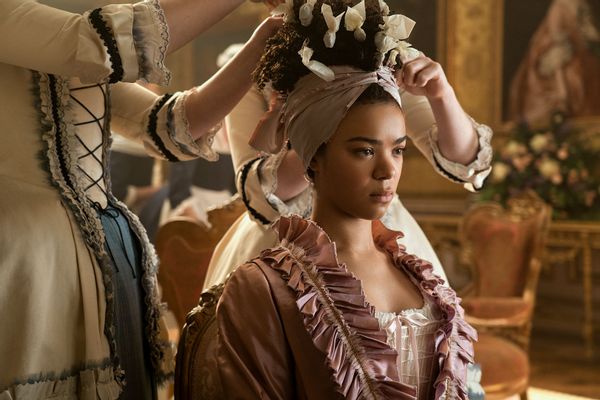 India Amarteifio as Young Queen Charlotte in "Queen Charlotte: A Bridgerton Story" (Liam Daniel/Netflix)
India Amarteifio as Young Queen Charlotte in "Queen Charlotte: A Bridgerton Story" (Liam Daniel/Netflix)
Amarteifio's queen-to-be is headstrong, cultured and refined, and resistant to marrying King George III (Corey Mylchreest). The pair meets for the first time on their wedding day, but the Dowager Princess Augusta (Michelle Fairley) is even more surprised to see Charlotte than her son is. George is smitten at the sight of her. Augusta evaluates her eventual daughter-in-law as if she's a broodmare: checking her teeth, her childbearing hips and her hands. Then comes the move that distinguishes "Queen Charlotte" from "Bridgerton": Augusta swipes her thumb across Charlotte's cheek to see if her complexion rubs off.
With this, "Queen Charlotte" treads ever so lightly into territory where "Bridgerton" barely dips a toe, making the highly fictionalized version of this royal's Blackness central to the story.
Charlotte of Mecklenburg-Strelitz and George III were real, prominent historical figures, the latest in a very long parade of notable people to star in dramas whose creators take ample liberties in telling their stories.
Few of these kings and queens are embroidered into fables focusing on the star-crossed nature of their love, ignoring actual matters of governance whose effects impact reality even now. George III ruled England when the American colonies revolted and, much more pertinent to this spin, presided over a country and a family that profited to an obscene degree from the slave trade.
Filtered through Rhimes' romantic treatment, they are champions of integration whose burning love for each elevates members of London's Black elite to the status of nobility. Charlotte and George marry, then George immediately bungles their budding marital bliss. Thanks to the intervention of a young Lady Danbury (Arsema Thomas), Charlotte comes to understand that her marriage to George has a purpose beyond their love.
"Queen Charlotte" is designed to woo the viewer with splendor.
Tied to its success is the permanence of the hastily bestowed peerages upon the Black upper class. Though they're wealthy, they've been denied titles until Charlotte's arrival. Princess Augusta hastily awards them to the Black ton's influential figures to make the white nobility comfortable with Charlotte's Blackness. Augusta quite plainly is not.
"She is very brown," George's mother stiffly tells the assembled men who brokered the marriage between England and the German territory from whence young Charlotte comes. "You did not say she would be that brown. Very brown."
Rhimes and "Bridgerton" creator Chris Van Dusen adapted Julia Quinn's novels with a "color-conscious" approach – not color-blind, Van Dusen explained, but casual in its inclusiveness to a degree that bordered on thoughtlessness. The second season corrected this somewhat. Rhimes' spinoff, meanwhile, doesn't ignore the British nobility's bigotry. Thomas' Lady Danbury battles Augusta for the same privileges white members of the ton automatically received when their titles were bestowed, including income and an estate.
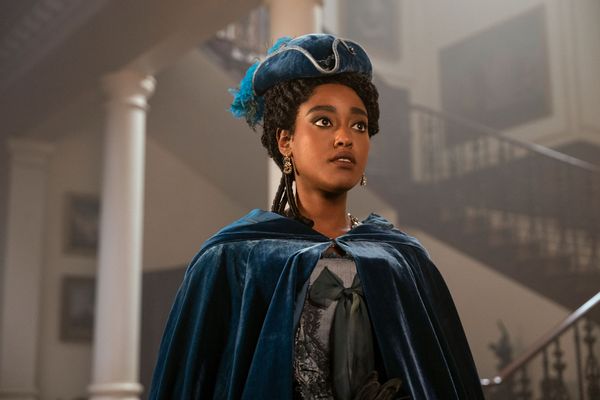 Arsema Thomas as Young Agatha Danbury in "Queen Charlotte: A Bridgerton Story" (Nick Wall/Netflix)
Arsema Thomas as Young Agatha Danbury in "Queen Charlotte: A Bridgerton Story" (Nick Wall/Netflix)
Though they're named Lords and Ladies at Charlotte and George's wedding, the Black nobles are denied entry into gentleman's clubs and access to the best seats at the opera. Equality. Without those things Lady Danbury points out, a title is simply a title.
"That . . . is grasping," Augusta responds, adding, "You should be grateful."
Rhimes is as aware of the arena she's entering as she is proficient in the form. She handles explaining how the ton's integration came to be in terms to which the modern audience can relate and may have experienced. Adjoa Andoh's elder Lady Danbury accumulated the society currency Regé-Jean Page's Simon spends without a thought as the Duke of Hastings in "Bridgerton." In "Queen Charlotte" her title, along with those of the ton's other members of the Black elite, is still "a taste of rare air."
She accelerates those winds by outsmarting the dowager princess and planning a ball featuring Black and white members of society mixing, something previously unheard of until Charlotte's arrival. And the only reason the ball is a success is that Charlotte and George make an appearance, letting everyone know it's safe.
"I do not know if you understand what you have done," George tells his bride later. "With one evening, one party, we have created more change, stepped forward more than Britain has in the last century. More than I would have dreamed."
Let's place the vacuousness of George's sentiment in generous terms. This is Rhimes offering an idealized version of how the world could be, and what is romance literature for if not presenting some version of a sweet dream?
But that also means she knows what she's ignoring. In case anyone were tempted to view "Queen Charlotte" as biographically accurate, the following disclaimer flutters across our screens before we glimpse the first lacy hemline.
"Dear Gentle Reader," Julie Andrews' voice intones, "This is the story of Queen Charlotte from Bridgerton. It is not a history lesson. It is fiction inspired by fact. All liberties taken by the author are quite intentional. Enjoy."
That settles that, perhaps. Also, probably not.
The notion of a hidden history where Charlotte was Britain's first Black queen pops up from time to time, notably after Meghan Markle's engagement to Prince Harry.
This is Rhimes offering an idealized version of how the world could be, and what is romance literature for if not presenting some version of a sweet dream?
But each of these transitory examinations skims the surface of what that may mean, making their cases through features captured in portraits or suppositions based on her family tree. If the real Queen Charlotte could claim any African cultural lineage, it would have come from a distant Portuguese forbear.
Whatever the case may be, her introduction via "Bridgerton" caused a stir, positive and otherwise. Few of those negative opinions have much to do with the performances. Amarteifio combines luminescence and edge to yield a stunning and very human portrayal. Rosheuvel once again gives us a statuesque, confident Queen who can be witty in one moment and poignant in the next. "Look at me," she declares to her spinster daughters in one scene. "I am gorgeous." That is undeniable.
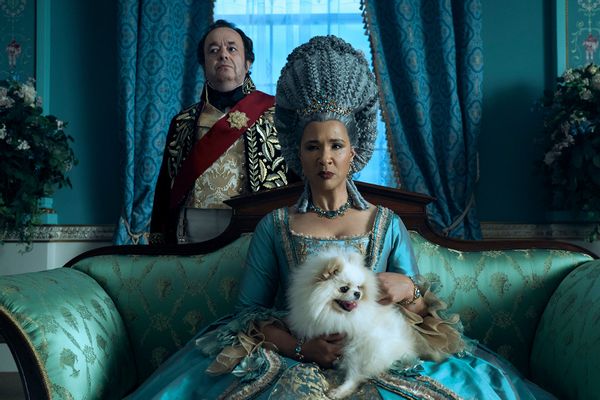 Hugh Sachs as Brimsley, Golda Rosheuvel as Queen Charlotte in "Queen Charlotte: A Bridgerton Story" (Liam Daniel/Netflix)
Hugh Sachs as Brimsley, Golda Rosheuvel as Queen Charlotte in "Queen Charlotte: A Bridgerton Story" (Liam Daniel/Netflix)
Like "Bridgerton," "Queen Charlotte" is designed to woo the viewer with splendor. From the sculptural wigs adding what looks like an additional foot to Rosheuvel's height to the opulently laden dinner tables, verdant gardens and sumptuous gowns, every visual is intoxicating and unmistakably fantastical.
Disclaimer notwithstanding, the audience will exercise their freedom to critique choices considered to be so oppositional to the recorded facts that ignoring them would be irresponsible. This is particularly relevant as Britain crowns a new king.
Want a daily wrap-up of all the news and commentary Salon has to offer? Subscribe to our morning newsletter, Crash Course.
Long before Harry and Meghan declared their independence from the crown, there has been a global demand that the royal family atone for profiting off the enslavement of Black people before and during the reign of George III along with the colonialist horrors committed well into the 20th century. Queen Elizabeth II's death and Charles' unlikability merely brought more attention to these voices. (A few have made enough of an impression on Buckingham Palace for them to leave the Kohinoor diamond, which India wants to be returned, out of the coronation ceremony.)
Ignoring this giant stain leads Chicago Tribune critic Nina Metz to concludes that Rhimes' execution doesn't feel "like a win for anything, representation or otherwise, no matter how smoothly 'Queen Charlotte' avoids this inconvenient truth about its title character."
Yes. Also, Quinn avoids this conflict in her "sensual" novels since all of her characters are white. Historically inspired stories have long elevated whiteness in literature, television and film. Ergo, Rhimes could have sidestepped such critiques by casting a white woman as Charlotte – for instance, Helen Mirren played her in 1994's "The Madness of King George."
It would be simpler to continue perpetuating the absence of non-white people in historic period pieces despite factual evidence that Black, brown and Asian people lived on the continent and in Britain, some of as members of elite social classes, during these eras. The multiracial cast of "The Great" reflects this.
People of color have only recently been centered in historically inspired confections like "Bridgerton," making their inclusion a relative novelty even now. Critiques reminding us of what these stories leave out have merit; rendering our history honestly and in all of its ugly truth is vital, especially at a time when legislators are scrubbing facts they deem uncomfortable from educational texts.
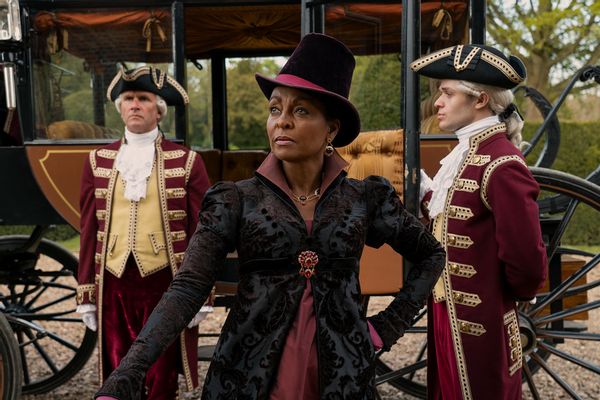 Adjoa Andoh as Lady Agatha Danbury in "Queen Charlotte: A Bridgerton Story" (Liam Daniel/Netflix)
Adjoa Andoh as Lady Agatha Danbury in "Queen Charlotte: A Bridgerton Story" (Liam Daniel/Netflix)
But "Bridgerton" and its offshoots aren't obligated to be true or vital, and its effort to acknowledge that the Black and white members of its storied society set didn't mix before Charlotte's arrival is about as responsible as these stories are going to get.
A possibly stronger counterpoint to the "Queen Charlotte" disclaimer rests not in its insistence that we see its historical fiction but in its classification as a romance above all. Anything grimmer than the dainty version of bigotry the characters waltz through risks flattening the champagne lightness that is the hallmark of all guilty pleasures.
That "Queen Charlotte" does a decent job in broaching these topics to explain the inclusive society taken as a given in "Bridgerton" without killing its charm is something of a feat. That success isn't the Queen's victory, though. It is Lady Danbury's, a woman only a few stations removed from obscurity.
"A problem is only a problem if the Palace says it is a problem," Augusta sniffs. The viewer might consider that too, enjoying this frilly, well-meaning fiction while understanding the history that inspires it is not altogether beautiful, and is with us even now.
All episodes of "Queen Charlotte: A Bridgerton Story" are streaming on Netflix.
Read more
about "Bridgerton"


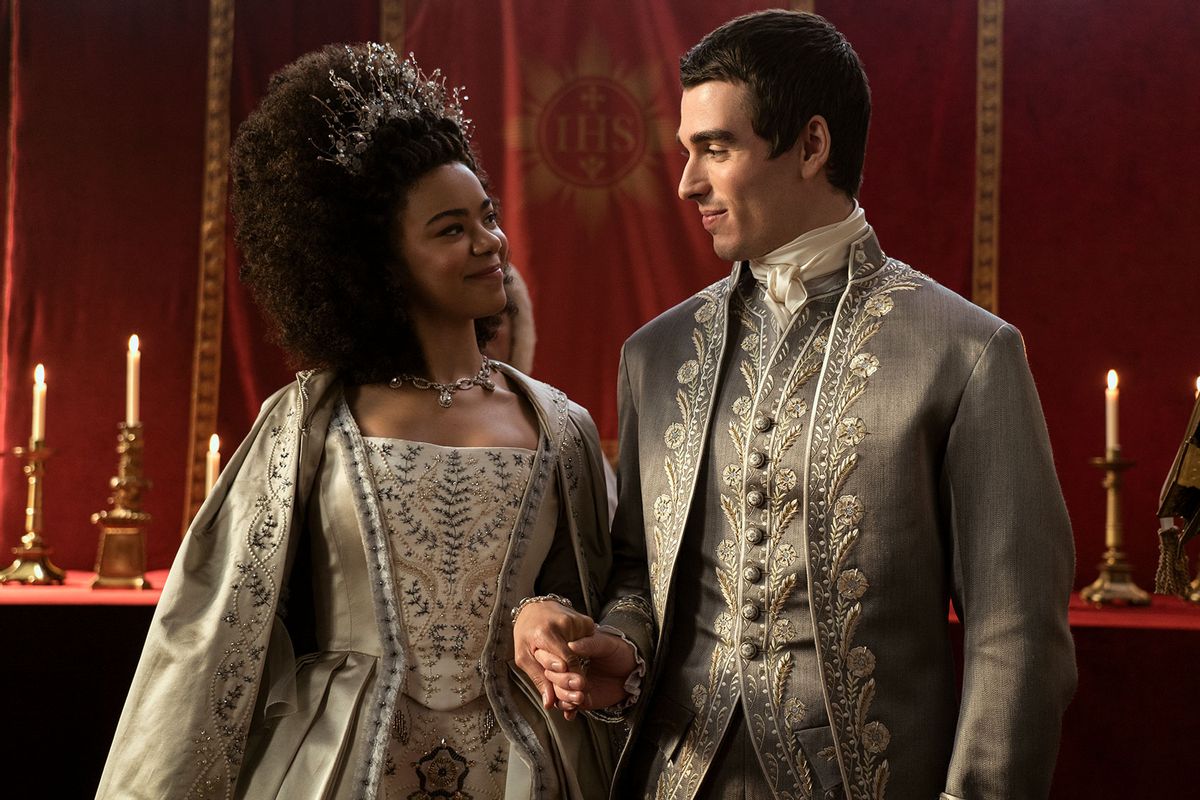
Shares